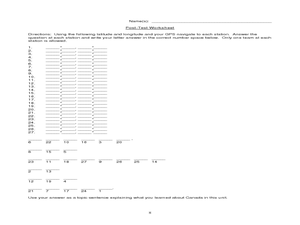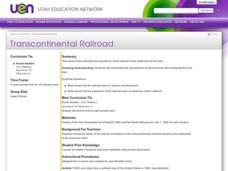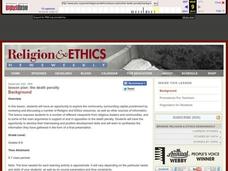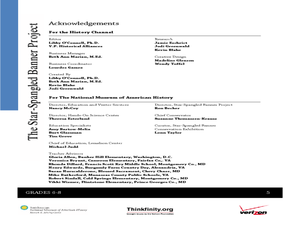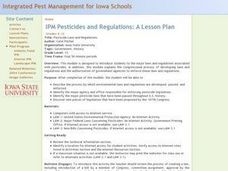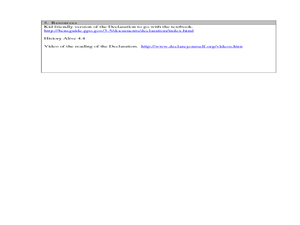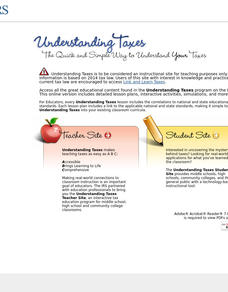Curated OER
The Federalist Papers
Students identify the Articles of Confederation and explain why it failed. They explain the argument over the need for a bill of rights in the Constitution and James Madison's role in securing its adoption by first Congress. Finally,...
Curated OER
Canada Eh? Pre/Post Tests on Canada Using GPS
Middle schoolers participate in a GPS activity and answer questions about Canada. In this Canada activity, students identify location by using a GPS Unit and latitude and longitude. Middle schoolers find an Inuksuk (station) and a...
Curated OER
Debating Iraq
Students analyze the main themes of President Bush's UN Speech and discussion of the NewsHour report on the Iraq Debate. In this debate lesson plan, students answer pre-listening questions and view a transcript of the speech. In groups...
Curated OER
Opposing Views on the Vietnam War
High schoolers consider opinions regarding the Vietnam War. In this Vietnam lesson, students compare Nixon and Johnson's policies about the war. High schoolers also research the anti-war movements as well as the sentiments of the those...
Constitutional Rights Foundation
Driver’s Licenses And Unauthorized Immigrants
Should driver's licenses be granted to unauthorized immigrants? That is the question class members grapple with in a lesson that asks them to first read a fact sheet that details the arguments for and against licensing unauthorized...
Curated OER
Transcontinental Railroad
Eleventh graders explain the development of the American West following the Civil War. They also explore the Homestead Act of 1862 and the Pacific Railway Act of 1862. They also participate in a simulation about the American West.
Curated OER
African-Americans and the New Deal's Civilian Conservation Corps
Students discover the responsibilities of the Civilian Conservation Corps. In this New Deal lesson, students analyze the impact that the inclusion of African Americans in the Civilian Conservation Corps made on race relations in the...
Curated OER
Italian Enemy Aliens During World War II: Evacuation from Prohibited Zones
Students read and discuss the Enemy Alien Evacuation Order. They perform research by reading newspaper articles from February 1942 as well as investigating available information on the Internet. Students work in groups to create a...
Curated OER
The Monroe Doctrine: Whose Doctrine Was It?
Was James Monroe the sole contributor of the Monroe Doctrine? Young scholars study the doctrine and cite evidence to show contributions of John Quincy Adams and Thomas Jefferson in its formulation.
Center for Civic Education
What Does Returning to Fundamental Principles Mean?
Looking for materials for your Constitution Day and Citizenship Day lessons? Then check out this packet of activities that not only gets your class members thinking critically about the fundamental principles at the heart of American...
Curated OER
What is Meant by Returning to Fundamental Principles?
What did the Founding Fathers mean by the importance of continually returning to fundamental principles? Your young historians will analyze a series of quotations illustrating the fundamental ideals and principles of the United States...
Curated OER
Wartime Posters
Learners recognize that, America's eventual involvement in World War II, not everyone initially agreed that intervention was the answer. They conduct research about the political, economic, sociological, and historical factors in the...
Curated OER
The Death Penalty
Students examine the controversy surrounding the death penalty. For this capital punishment lesson, students explore the ethical concerns and religious beliefs regarding the death penalty. Students conduct research, interview people, and...
Curated OER
Slave Culture during the Age of Jackson
Students consider slave culture during the time of Andrew Jackson. In this lesson on slavery, students watch a PowerPoint presentation, take notes, then analyze an extensive list of primary sources in order to understand what and how...
Curated OER
Destructive Impact of Environment on Artifacts
Students recognize that artifacts are destroyed over time. In this environmental factors on artifacts lesson, students experiment and observe through the microscope to find the environmental impact on artifacts. Students make a list of...
Curated OER
Pesticide Laws and Regulations
Students explore the laws and regulations of pesticides. In this pesticides instructional activity, students research how laws are made and identify the agencies responsible for enforcing the laws. Students research the Internet for laws...
Curated OER
United States Pride
Third graders learn the responsibility of citizenship and learn facts about a state they choose to research.
Curated OER
Political and Cultural Road to the American Revolution
Learners examine the Declaration of Independence. For this Revolutionary War instructional activity, young scholars use primary sources to analyze how the creation of the Declaration of Independence lead to the development of the United...
Curated OER
AIH-16: Effect of Revolutionary War on American Indians
Students examine how American Indian cultures changed as a result of the Revolutionary War.
Curated OER
Kids Get School Named for Obama
Students read about the renaming of a school for Barack Obama. In this political lesson, the teacher presents vocabulary words from the news article, then the students read the article and answer comprehension questions. Lesson includes...
National Park Service
Civil War to Civil Rights: From Pea Ridge to Central High
Explore how the Civil War impacted the Civil Rights Movement. Class members complete a series of projects for a unit that uses a layered curriculum approach to learning.
Curated OER
The Politics Of Taxation
Students explain that taxation involves a compromise of conflicting goals and that lobbyists can influence lawmakers' decisions about taxes. They can explain why people of similar incomes often pay different tax rates and work in teams...
National Endowment for the Humanities
Slavery and the American Founding: The "Inconsistency Not to Be Excused"
High schoolers examine slavery in the revolutionary and colonial eras of the United States. In this slavery lesson, students investigate the presence of slavery in early America, the language of the Constitution, and the intent of the...
National Endowment for the Humanities
George Washington: The Precedent President
Everyone knows that George Washington was the first president, but do your scholars know why that was so important? The lesson plan, the third in a sequence of three, allows learners to understand how George Washington set a precedent...



